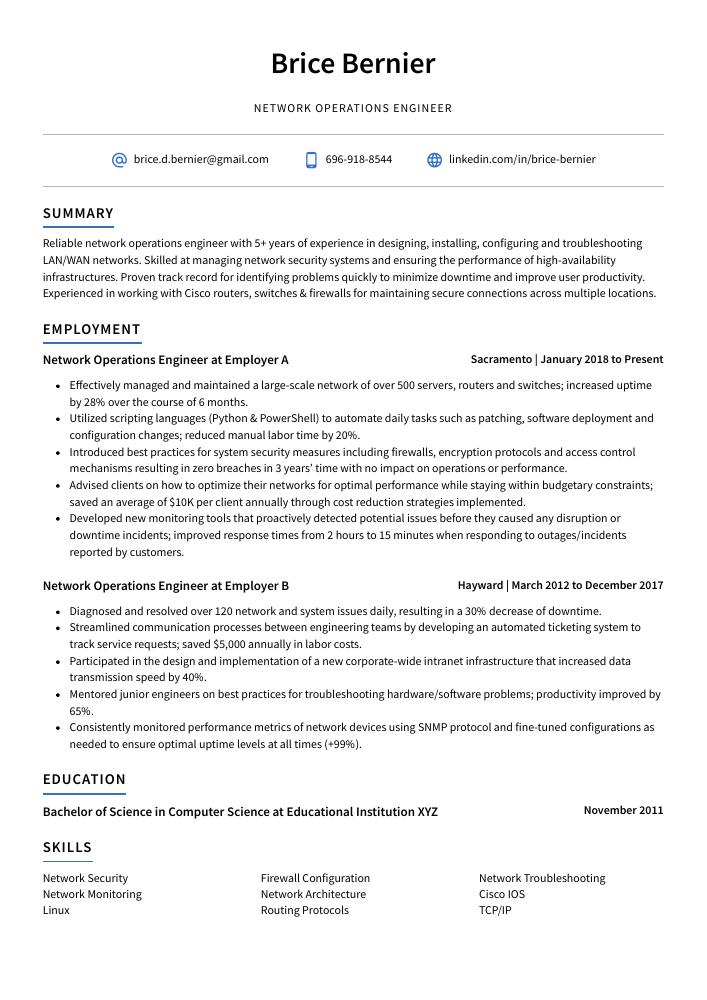Network Operations Engineer Resume Guide
Network operations engineers are responsible for monitoring and maintaining computer networks to ensure they run smoothly. They install, configure, test, troubleshoot and maintain network hardware and software including routers, switches, firewalls and other related equipment. They also monitor system performance in order to identify potential problems or areas of improvement.
You know the ins and outs of network operations like nobody else. To get noticed by recruiters, you need to create a resume that highlights your technical expertise in this field. Doing so will help you land an amazing job opportunity in no time!
This guide will walk you through the entire process of creating a top-notch resume. We first show you a complete example and then break down what each resume section should look like.
Table of Contents
The guide is divided into sections for your convenience. You can read it from beginning to end or use the table of contents below to jump to a specific part.
Network Operations Engineer Resume Sample
Brice Bernier
Network Operations Engineer
[email protected]
696-918-8544
linkedin.com/in/brice-bernier
Summary
Reliable network operations engineer with 5+ years of experience in designing, installing, configuring and troubleshooting LAN/WAN networks. Skilled at managing network security systems and ensuring the performance of high-availability infrastructures. Proven track record for identifying problems quickly to minimize downtime and improve user productivity. Experienced in working with Cisco routers, switches & firewalls for maintaining secure connections across multiple locations.
Experience
Network Operations Engineer, Employer A
Sacramento, Jan 2018 – Present
- Effectively managed and maintained a large-scale network of over 500 servers, routers and switches; increased uptime by 28% over the course of 6 months.
- Utilized scripting languages (Python & PowerShell) to automate daily tasks such as patching, software deployment and configuration changes; reduced manual labor time by 20%.
- Introduced best practices for system security measures including firewalls, encryption protocols and access control mechanisms resulting in zero breaches in 3 years’ time with no impact on operations or performance.
- Advised clients on how to optimize their networks for optimal performance while staying within budgetary constraints; saved an average of $10K per client annually through cost reduction strategies implemented.
- Developed new monitoring tools that proactively detected potential issues before they caused any disruption or downtime incidents; improved response times from 2 hours to 15 minutes when responding to outages/incidents reported by customers.
Network Operations Engineer, Employer B
Hayward, Mar 2012 – Dec 2017
- Diagnosed and resolved over 120 network and system issues daily, resulting in a 30% decrease of downtime.
- Streamlined communication processes between engineering teams by developing an automated ticketing system to track service requests; saved $5,000 annually in labor costs.
- Participated in the design and implementation of a new corporate-wide intranet infrastructure that increased data transmission speed by 40%.
- Mentored junior engineers on best practices for troubleshooting hardware/software problems; productivity improved by 65%.
- Consistently monitored performance metrics of network devices using SNMP protocol and fine-tuned configurations as needed to ensure optimal uptime levels at all times (+99%).
Skills
- Network Security
- Firewall Configuration
- Network Troubleshooting
- Network Monitoring
- Network Architecture
- Cisco IOS
- Linux
- Routing Protocols
- TCP/IP
Education
Bachelor of Science in Computer Science
Educational Institution XYZ
Nov 2011
Certifications
Cisco Certified Network Professional (CCNP)
Cisco
May 2017
1. Summary / Objective
The summary or objective at the beginning of your network operations engineer resume should provide an overview of why you are a great fit for the role. This is where you can highlight your most impressive qualifications, such as certifications in multiple networking technologies, experience managing large-scale networks and troubleshooting complex technical issues. You could also mention any awards or recognition you have received for outstanding performance in this field.
Below are some resume summary examples:
Seasoned Network Operations Engineer with 5+ years of experience in network architecture, design, and implementation. Highly knowledgeable on all aspects of LAN/WAN technology such as routers, switches, firewalls configurations (Cisco IOS). Proven track record for providing reliable solutions to improve the stability and performance of complex networks. Currently seeking a challenging role at XYZ company where my expertise can be utilized to its fullest potential.
Driven network operations engineer with 8+ years of experience in planning, designing, and implementing complex network solutions. Possesses an expertise in troubleshooting infrastructure systems and resolving technical issues quickly. Recently saved Company X $25,000 by identifying a hardware issue that was causing excessive downtime across the organization. Looking to join ABC Tech to leverage my skills and contribute towards their mission-critical projects.
Skilled network operations engineer with 8+ years of experience in designing, installing, and maintaining networks for organizations. At XYZ, identified a potential security breach that would have cost the company over $250K. Also managed the installation of network hardware and software to ensure seamless integration into existing infrastructure. Possesses excellent problem-solving skills combined with strong knowledge of networking protocols & standards.
Well-rounded and experienced network operations engineer with 10+ years of experience in designing, implementing and maintaining large-scale enterprise networks. Highly proficient at troubleshooting complex networking issues, configuring routers/switches, monitoring performance and optimizing system resources. Proven track record of successful implementations which have resulted in increased efficiency and cost savings for the organization.
Amicable and proactive network operations engineer with 5+ years of experience in the IT industry. Extensive knowledge and hands-on expertise in LAN/WAN, routing protocols, firewall management, system monitoring tools and general troubleshooting activities. Successfully designed an automated process for identifying security incidents on corporate networks at XYZ Corporation – resulting in a 70% reduction of response time to critical alerts.
Determined and experienced Network Operations Engineer with 8+ years of success in designing, implementing, and maintaining complex networking infrastructures. Seeking to join ABC Tech as a Network Operations Engineer where I can utilize my expertise in troubleshooting network issues and ensure reliable service delivery. Proven track record of reducing downtime by 20% while improving the overall performance of networks by 30%.
Accomplished Network Operations Engineer with 8+ years of experience in large-scale, multi-vendor network operations. Experienced in designing and implementing complex networks to meet customer requirements while ensuring service level agreements are met. Seeking a role at ABC where I can contribute my expertise in building reliable, secure network infrastructures that maximize efficiency and scalability.
Diligent network operations engineer with 7+ years of experience implementing and managing complex network infrastructures, security systems, and software. Skilled in troubleshooting networks to identify issues quickly and efficiently. Seeking to join ABC Technologies as a Network Operations Engineer where I can use my skills to ensure the reliability of mission-critical IT services for clients worldwide.
2. Experience / Employment
The employment (or experience) section is where you provide details on your work history. This should be written in reverse chronological order, meaning the most recent job is listed first.
When writing this section, it’s best to stick to bullet points for clarity and brevity. You want to take some time to think about what you did and the quantifiable results obtained from your efforts. For example, instead of saying “Managed network operations,” try something like “Maintained a 99% uptime rate across all servers by proactively monitoring system performance.”
To write effective bullet points, begin with a strong verb or adverb. Industry specific verbs to use are:
- Configured
- Monitored
- Troubleshot
- Optimized
- Implemented
- Resolved
- Analyzed
- Diagnosed
- Secured
- Upgraded
- Administered
- Documented
- Tested
- Managed
- Automated
Other general verbs you can use are:
- Achieved
- Advised
- Assessed
- Compiled
- Coordinated
- Demonstrated
- Developed
- Expedited
- Facilitated
- Formulated
- Improved
- Introduced
- Mentored
- Participated
- Prepared
- Presented
- Reduced
- Reorganized
- Represented
- Revised
- Spearheaded
- Streamlined
- Structured
- Utilized
Below are some example bullet points:
- Competently diagnosed and resolved network issues for over 100 systems, reducing downtime by 40% within the first quarter of employment.
- Reorganized existing networks to ensure maximum stability and security; implemented a new firewall system that blocked 90% of malicious cyberattacks in one year.
- Documented all changes made to each client’s unique network architecture, ensuring easy tracking of data flows during troubleshooting situations.
- Upgraded outdated hardware components such as routers, modems and switches to maximize overall performance levels; improved speeds by up to 50%.
- Represented company at various IT conferences across the country – developed relationships with key industry personnel which resulted in multiple business contracts worth $75K+.
- Monitored the performance of all network operations, including routers, switches and other networking equipment; proactively identified potential problems and resolved them in a timely manner to ensure 99.9% uptime.
- Proficiently managed the installation and configuration of computer networks across multiple sites, including setting up security protocols for remote access points with no system downtime or data loss.
- Demonstrated technical knowledge by troubleshooting hardware/software issues on PCs, servers & mobile devices while providing IT support to over 500 users in various departments within the organization; reduced service ticket backlogs by 20%.
- Spearheaded the implementation of new projects & upgrades such as VoIP systems, video conferencing solutions and cloud-based services; completed installations ahead of schedule while staying under budget by $1K+.
- Revised existing processes related to monitoring & maintenance activities which resulted in an improvement of overall operational efficiency by 35%.
- Configured, maintained and upgraded over 500 routers, switches, firewalls and servers in a large corporate network; achieved an average uptime of 98%+ across all systems.
- Resolved complex technical issues related to network performance, security breaches and server outages within tight deadlines; reduced system downtime by 15%.
- Confidently handled troubleshooting tickets from customers who encountered problems with their internet or Wi-Fi connection on multiple occasions.
- Secured the company’s digital assets against potential cyber threats using antivirus software updates & firewall configurations; prevented data leakage incidents by 70%.
- Analyzed extensive log files for identifying suspicious activities occurring inside the intranet environment and took corrective actions accordingly to ensure optimal safety standards were followed at all times.
- Optimized network performance by 20% through the monitoring of network systems and troubleshooting issues, resulting in a decrease of downtime to less than 5 minutes.
- Improved existing infrastructure operations by proactively maintaining system configurations and executing software updates across multiple sites nationwide; reducing security risks by 15%.
- Meticulously managed customer service requests related to networking such as installation & maintenance support, resolving customer complaints within 2 hours on average.
- Administered servers & workstations using Windows/Linux operating systems for over 150 daily users, ensuring that all devices had up-to-date antivirus protection at all times.
- Managed day-to-day IT tasks including user account creation/deletion, data backups & restores, DNS management and server patching; reduced manual workloads by 40%.
- Presented detailed network performance reports to senior management, highlighting potential issues and recommending solutions that increased operational efficiency by 40%.
- Troubleshot critical system errors within the LAN/WAN environment, mitigating downtime instances from 6 hours to less than 1 hour each time.
- Expedited problem resolution processes such as troubleshooting connectivity problems and resolving software compatibility issues; reduced average response times significantly by 25%.
- Actively monitored network systems for anomalies on a 24-hour basis using various monitoring tools and protocols; identified security vulnerabilities in advance of any malicious attacks or intrusions over 100+ times since joining the company 3 years ago.
- Implemented advanced routing policies across multiple locations with an aggregate data throughput capacity of up to 10Gbps; streamlined remote access operations for 2000 users worldwide while ensuring secure connections at all times.
- Assessed network performance, identifying and resolving any network issues in a timely manner; reduced system downtime by 10% over the course of one year.
- Prepared technical design documents to ensure optimal configuration for back-end systems and networks; achieved 100% compliance with industry standards for network architecture & security protocols.
- Compiled daily status reports on all operations activities, ensuring that senior management was informed about any potential risks or problems in real time – resulting in more efficient decision making processes organization wide.
- Formulated detailed plans for troubleshooting complex networking problems such as IP conflicts, latency delays and packet loss; continually improved customer experience metrics by 15%.
- Thoroughly tested new hardware installations prior to deployment, reducing implementation time from 5 days to 2 days on average while also preventing costly mistakes due to incorrect installation procedures being followed.
- Tested and performed maintenance on network hardware and software, achieving a 99.8% uptime rate with no outages in the last quarter.
- Achieved significant cost savings by automating routine tasks such as patch management and system updates; reduced operating costs by $4,500 per month.
- Automated process for generating daily reports to detect anomalies or malicious threats within the network infrastructure; successfully identified potential vulnerabilities before they could be exploited by attackers.
- Successfully deployed new systems including routers, switches and firewalls over multiple sites while ensuring secure communication links between all locations without disrupting existing operations.
- Reduced incidents of data loss due to cyber-attacks through systematic analysis of traffic logs using Splunk SIEM solution; implemented countermeasures that lowered security incident rates from 5/day to 1/week.
- Facilitated the installation, configuration and maintenance of 200+ network systems & devices across multiple sites; reduced system downtime by 50%.
- Diligently monitored the performance of various networks using SNMP tools and identified potential issues before they occurred, ensuring that all IT services remained operational at all times.
- Coordinated with third-party vendors to procure new hardware/software components for a wide variety of products including routers, switches, firewalls and servers; saved $15K in annual costs on average.
- Structured complex data transfer protocols to transmit information between different locations in an efficient manner while maintaining privacy standards; improved throughput speed by 40%.
3. Skills
Skill requirements will differ from employer to employer – this can easily be determined via the job advert. Organization ABC may require the candidate to have experience with Cisco routers and switches, while organization XYZ may be looking for someone who is proficient in network security.
It is essential to customize your skills section according to each job you are applying for; this will help ensure that applicant tracking systems (ATS) pick up on relevant keywords before passing it onto a human recruiter.
In addition, you should also elaborate on some of these skills in other sections such as the summary or work experience area – this can give recruiters more insight into how well-versed you are in certain areas.
Below is a list of common skills & terms:
- Cisco IOS
- DNS Management
- Firewall Configuration
- Linux
- Network Architecture
- Network Monitoring
- Network Security
- Network Troubleshooting
- Routing Protocols
- TCP/IP
4. Education
Including an education section on your resume will depend on how far along you are in your career. If you just graduated and have no work experience, mention your education below the resume objective. However, if you have been working as a network operations engineer for years with plenty of different responsibilities to showcase, omitting the education section is perfectly fine.
If an education section is included, try to highlight courses and subjects relevant to the job role such as networking technology or programming languages used in this field.
Bachelor of Science in Computer Science
Educational Institution XYZ
Nov 2011
5. Certifications
Certifications are a great way to demonstrate your knowledge and expertise in a particular field. They can be especially useful when applying for jobs that require specific certifications or qualifications, as they show employers that you are qualified and capable of performing the job duties.
Including any relevant certifications on your resume is an excellent way to prove to potential employers that you have what it takes to succeed in their role. Be sure to list out each certification clearly with its title, organization name, date earned, and other pertinent details so hiring managers can easily identify them.
Cisco Certified Network Professional (CCNP)
Cisco
May 2017
6. Contact Info
Your name should be the first thing a reader sees when viewing your resume, so ensure its positioning is prominent. Your phone number should be written in the most commonly used format in your country/city/state, and your email address should be professional.
You can also choose to include a link to your LinkedIn profile, personal website, or other online platforms relevant to your industry.
Finally, name your resume file appropriately to help hiring managers; for Brice Bernier, this would be Brice-Bernier-resume.pdf or Brice-Bernier-resume.docx.
7. Cover Letter
Including a cover letter with your job application can make a huge difference. It is an opportunity to explain more about yourself and demonstrate why you are the ideal candidate for the role.
A cover letter usually consists of 2 to 4 paragraphs, each providing extra information not included in your resume. By writing one, you have an opportunity to show off your communication skills and convince recruiters that you are worth considering for their opening.
Below is an example cover letter:
Dear Earline,
I am writing to apply for the position of Network Operations Engineer at XYZ Corporation. With over 7 years of experience in network engineering and administration, I am confident that I can be an asset to your team.
During my time at ABC Corporation, I was responsible for managing a large-scale enterprise network comprising over 10,000 devices spread across 100 locations. My duties included troubleshooting networking issues, implementing security policies, and overseeing upgrades and maintenance tasks. In addition, I also led a team of junior engineers and technicians, providing guidance and mentorship when needed.
I have extensive experience working with popular networking technologies such as Cisco routers and switches, Juniper firewalls, and F5 load balancers. In addition, I am also well-versed in common protocols such as BGP, OSPF, TCP/IP, UDP etc. My strong technical skills coupled with my ability to work well under pressure makes me an ideal candidate for this role.
In closing, I would like to thank you for taking the time to review my application. If you have any questions or concerns feel free to contact me at [email address] or by phone at [phone number]. Once again thank you for your consideration; I look forward to hearing from you soon!
Sincerely,
Brice
Network Operations Engineer Resume Templates
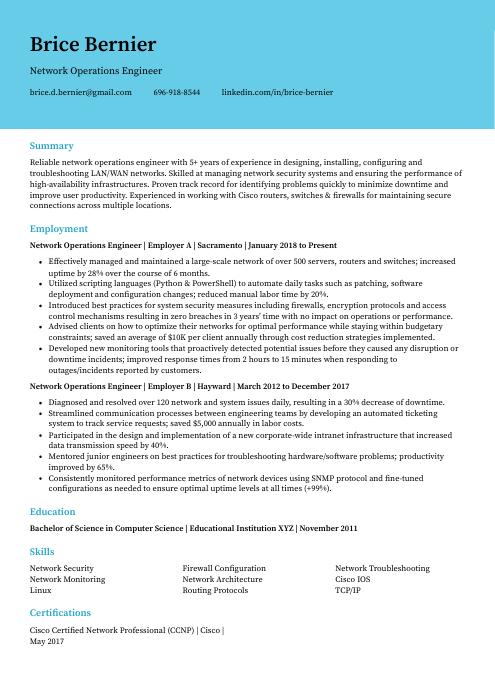 Dugong
Dugong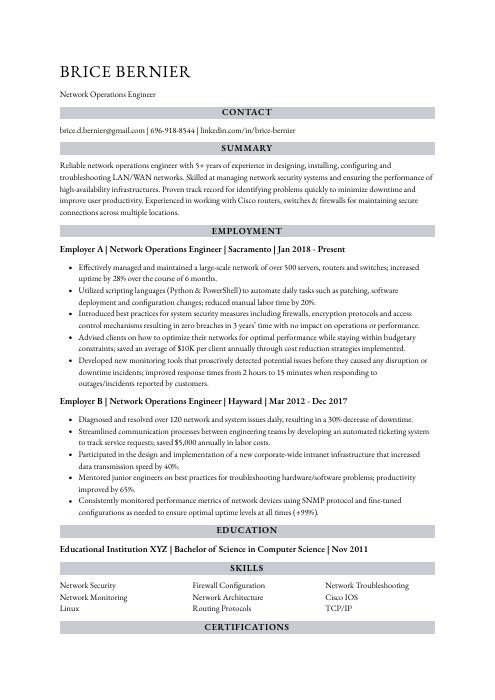 Numbat
Numbat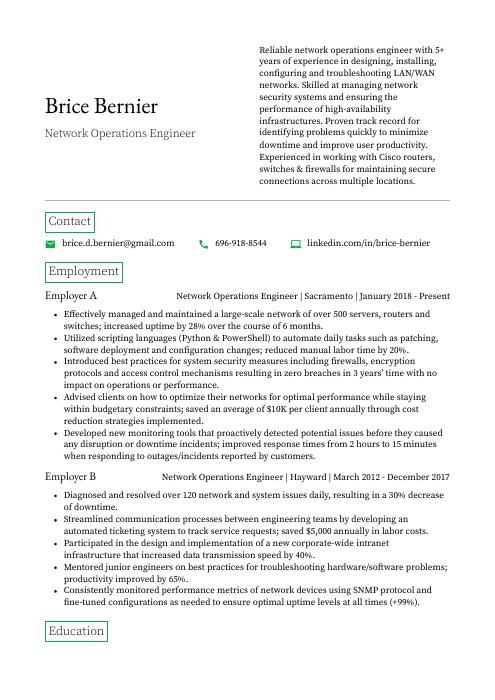 Quokka
Quokka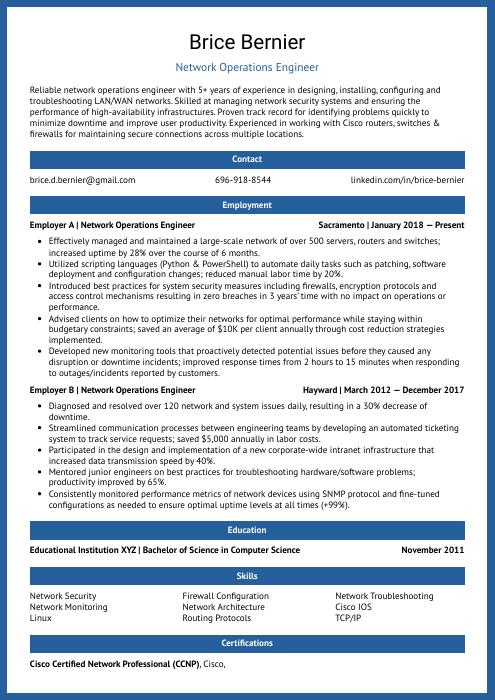 Ocelot
Ocelot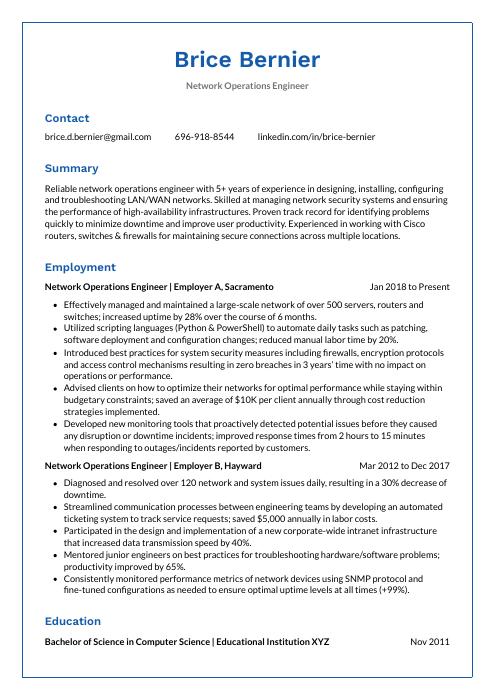 Markhor
Markhor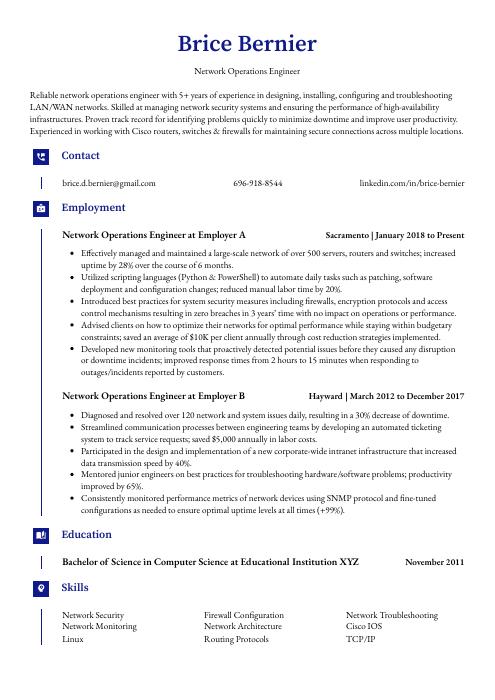 Gharial
Gharial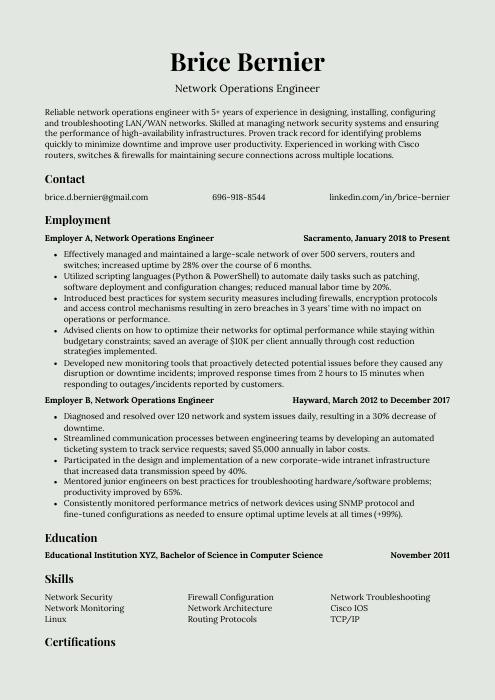 Saola
Saola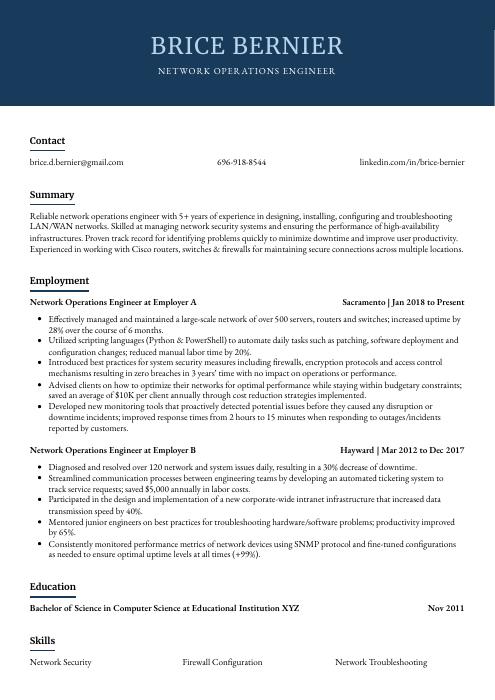 Bonobo
Bonobo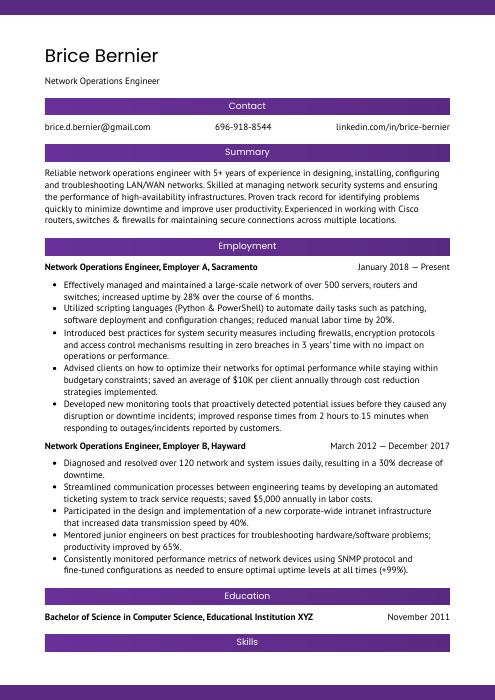 Jerboa
Jerboa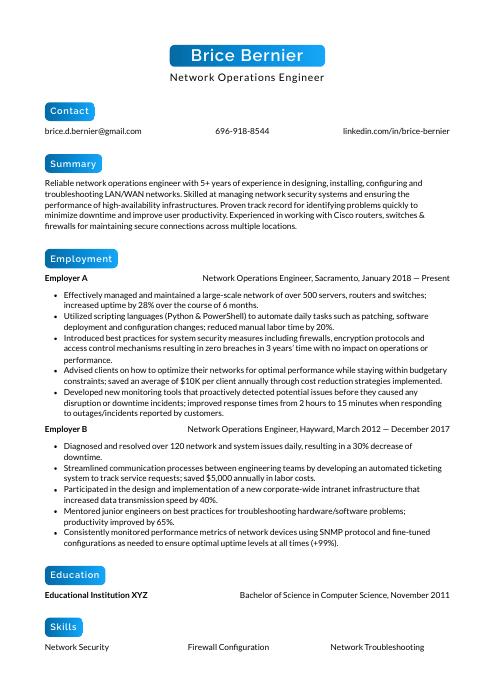 Kinkajou
Kinkajou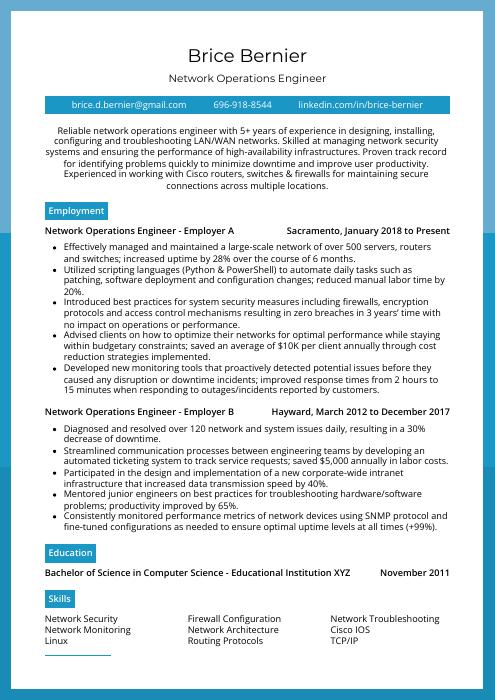 Rhea
Rhea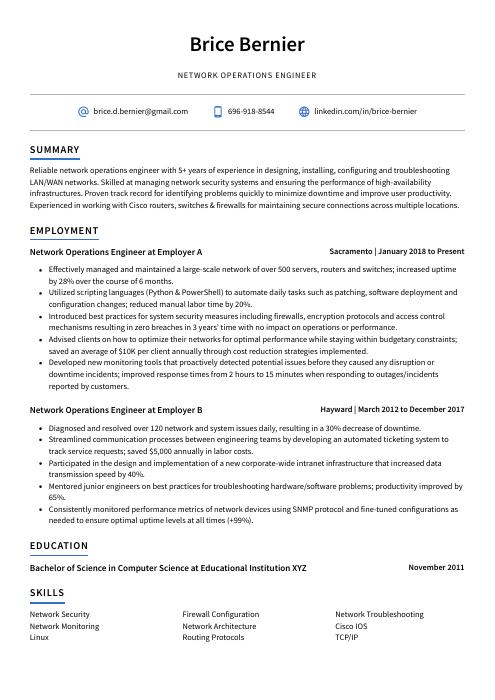 Axolotl
Axolotl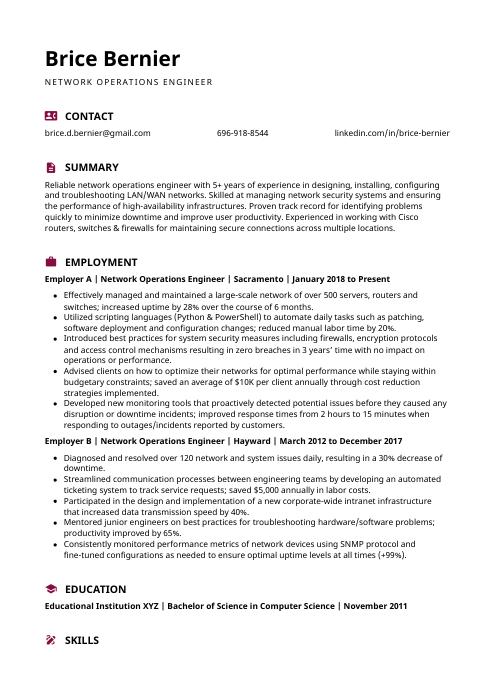 Hoopoe
Hoopoe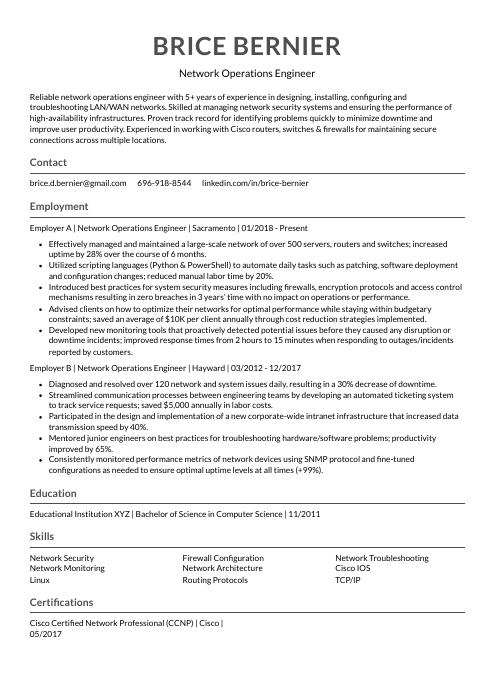 Indri
Indri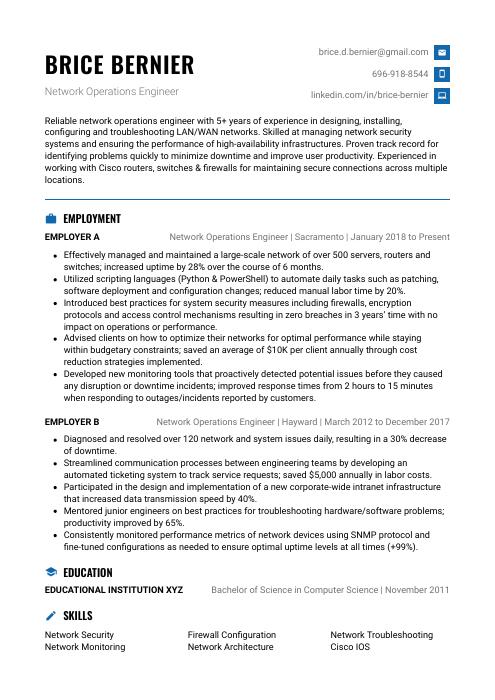 Echidna
Echidna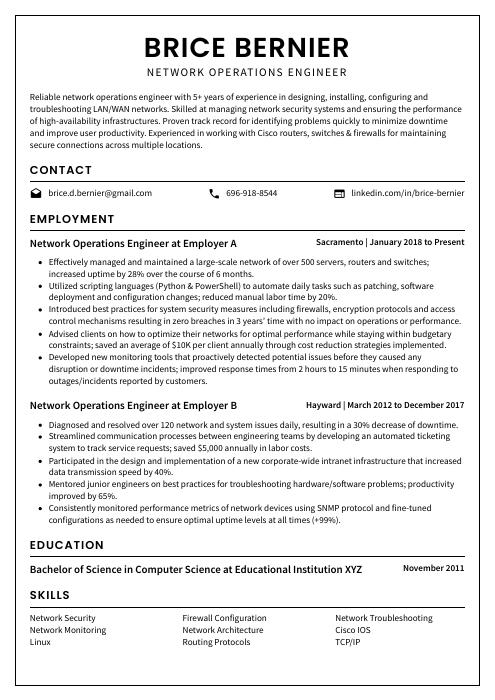 Cormorant
Cormorant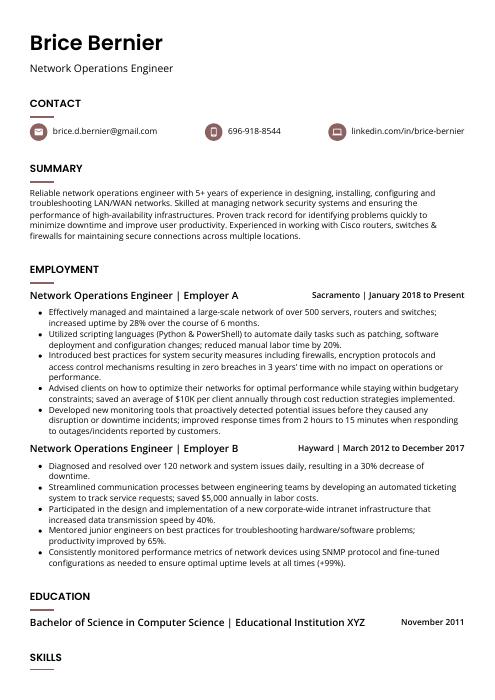 Fossa
Fossa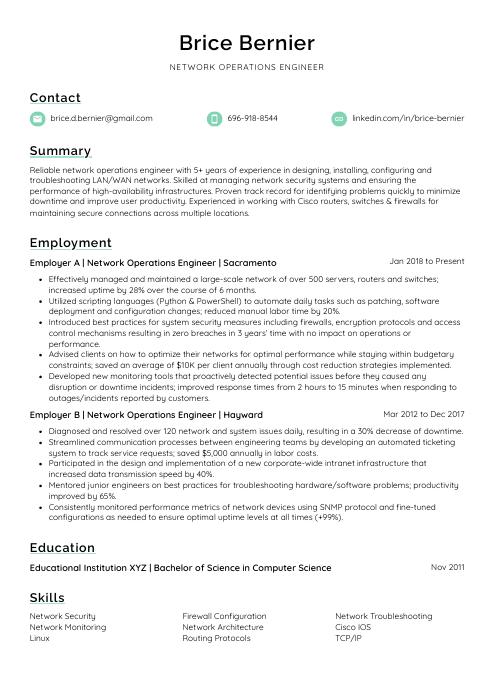 Lorikeet
Lorikeet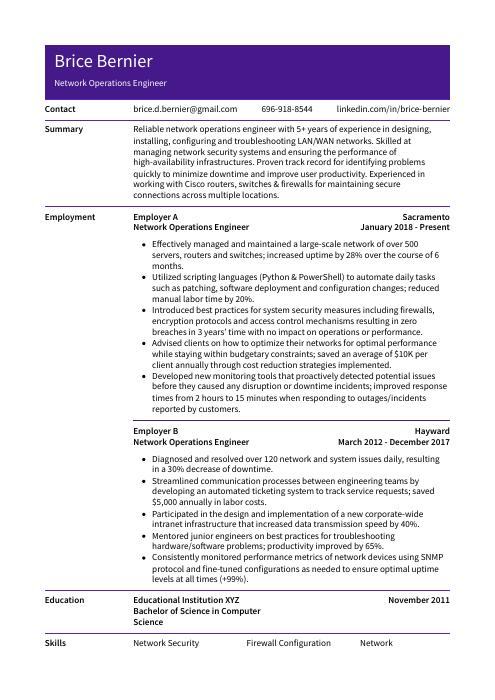 Pika
Pika Rezjumei
Rezjumei
